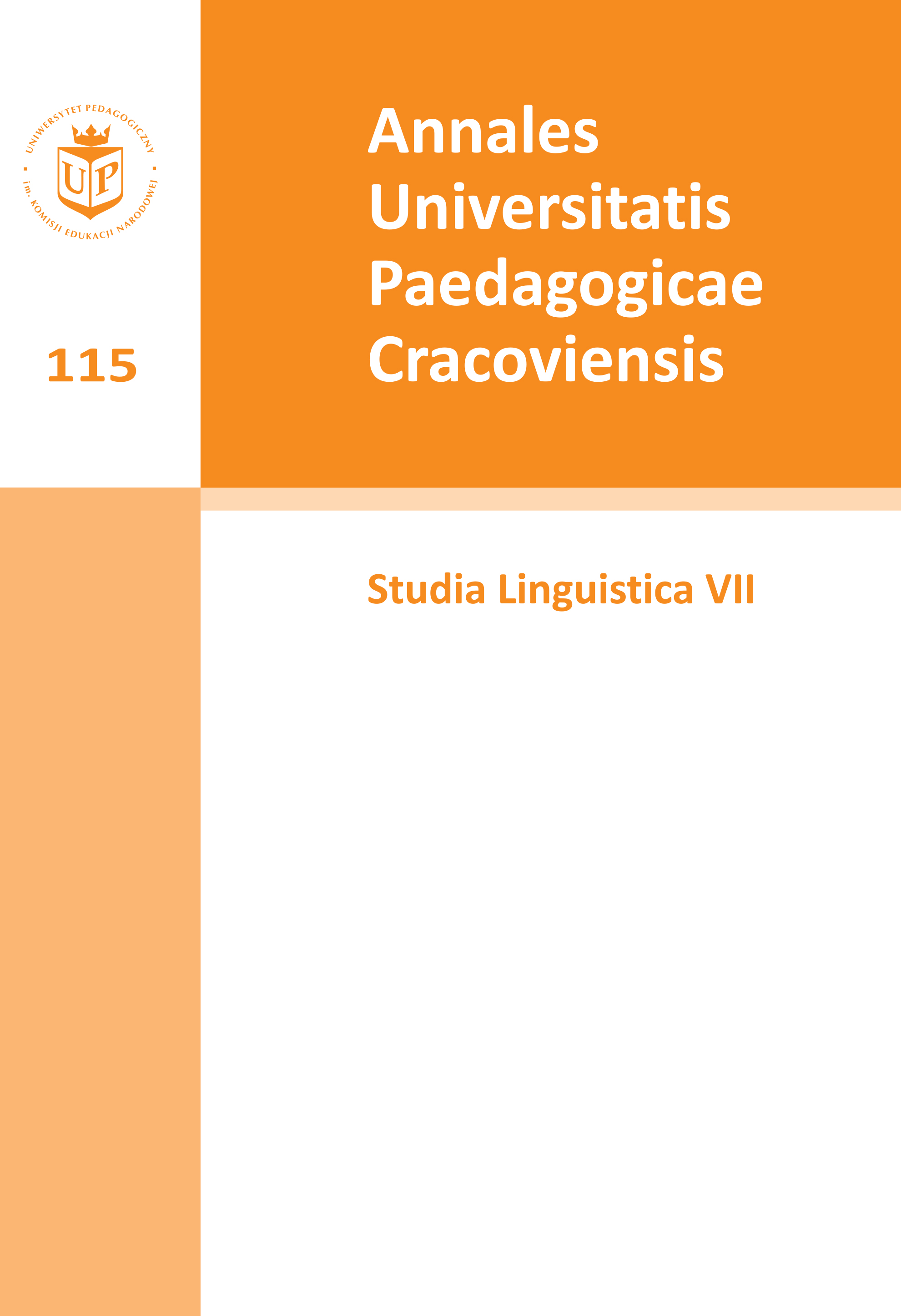Mentálny „koridor“ mediálnej spoločnosti: fascinácia zábavou
Main Article Content
Abstract
In the paper the author points out current life-style trends, which are largely influenced by the mass media and the entertainment industry. In the course of two centuries, the mass media and the entertainment sector have become important factors in shaping the mentality of post- -modern society. The aim of the article is to analyze the phenomenon of media entertainment which has become an indispensable part of contemporary society’s everyday life. People are fascinated by entertainment because it gives them pleasure, experience, cultural competences but also allows to escape from reality.
Downloads
Article Details

This work is licensed under a Creative Commons Attribution-NonCommercial-NoDerivatives 4.0 International License.
Author, submitting a text to the editorial board of the journal “Annales Universitatis Paedagogicae Cracoviensis. Studia Linguistica", certifies that the content of the article has not been published so far and that the work does not violate in any way the copyright or related rights of other person, as well as other rights of third parties, and that no one's rights to the work (or any part thereof) have been missed. After signing the contract, the property rights to the published materials are transferred to the Scientific Publisher of the University of the National Education Commission, Krakow.
“Annales Universitatis Paedagogicae Cracoviensis. Studia Linguistica” is an open access journal, and all its content is made available free of charge to users and institutions under the Creative Commons CC-BY-NC-ND 4.0 license (attribution, non-commercial use, no derivative works). Under this license, the authors agree that their work may be lawfully reused for any purpose, except for commercial purposes, without the prior consent of the author or publisher. Everyone can read, download, copy, print, distribute and process these works, provided that the author's marking and the original publication place are correct. Published texts may not be used to create derivative works (e.g. to translate and publish in another language without the consent of the publisher). This is in line with the BOAI (Budapest Open Access Initiative) definition. "Studia Linguistica" does not charge for submitting or processing articles.
References
Arendtová H., 1994, Krize kultury, Praha.
Google Scholar
Bourdieu P., 2002, O televizi, Praha.
Google Scholar
Burton G., Jirák J., 2001, Úvod do studia medií, Brno.
Google Scholar
Čábyová Ľ., 2008, Základné oblasti a problémy spoločensky zodpovedného podnikania, in: J. Matúš, Ľ. Čábyová, K. Ďurková, Nové trendy v marketingu, Trnava.
Google Scholar
Čábyová Ľ., 2010, Mediálny marketing, Trnava.
Google Scholar
Götllich U., Winter R. (ed.), 2000, Politik des Vergnügens. Zur Diskusion der Populärkultur in den Cultural Studies, Köln.
Google Scholar
Hudíková Z., 2009, Profesionálne kompetencie redaktora televízneho spravodajstva, in: S. Magál, M. Mistrík, M. Solík, Masmediálna komunikácia a realita II, Trnava.
Google Scholar
Hudíková Z., 2010, Marketing mediálnych hviezd – aplikácia na televízne prostredie, in: J. Matúš, D. Kollárová, Nové trendy v marketingu, Trnava.
Google Scholar
Huntington P.S., 2001, Střet civilizací. Boj kultur a proměna světového řádu, Praha.
Google Scholar
Jenča I., 2004, Rozhlasové spravodajstvo, Bratislava.
Google Scholar
Jenča I., 2009, Mediálne násilie detí, in: S. Magál, M. Mistrík, M. Solík, Masmediálna komunikácia a realita II, Trnava.
Google Scholar
Jirák J., Köpplová B., 2003, Médiá a společnost, Praha.
Google Scholar
Kloskowska A., 1967, Masová kultúra, Praha.
Google Scholar
Kunczik M., 1995, Základy masové komunikace, Praha.
Google Scholar
Lasch Ch., 1991, The Culture of Narcissism, New York.
Google Scholar
Lipovetsky G., 1999, Soumrak povinnosti. Bezbolestná etika nových demokratických časú, Praha.
Google Scholar
Lipovetsky G., 2001, Éra prázdnoty. Úvahy o současném individualizmu, Praha.
Google Scholar
Lipovetsky G., 2007, Paradoxní štěstí. Esej o hyperkonzumní společnosti, Praha.
Google Scholar
Lohisse J., 2003, Komunikační systémy. Socioantropologický pohled, Praha.
Google Scholar
Magál S., Mistrík M., Solík M., 2009, Masmediálna komunikácia a realita I, Trnava.
Google Scholar
McNair B., 2004, Sociologie žurnalistiky, Praha.
Google Scholar
McQuail D., 1999, Úvod do masovej komunikácie, Praha.
Google Scholar
Petranová D., 2007, Podstata a význam kritického myslenia v mediálnej výchove, in: S. Magál, M. Mistrík, D. Petranová, Mediálne kompetencie v informačnej spoločnosti, Trnava.
Google Scholar
Petranová D., 2009, Reálny pohľad na stav mediálnej výchovy na Slovensku, in: S. Magál, S. Mistrík, M. Solík, Masmediálna komunikácia a realita II, Trnava.
Google Scholar
Postman N., 1999, Ubavit se k smrti, Praha.
Google Scholar
Ramonet I., 2003, Tyranie médií, Praha.
Google Scholar
Russ-Mohl S., Bakičová H., 2005, Žurnalistika. Komplexní průvodce praktickou žurnalistikou, Praha.
Google Scholar
Tušer A. et al., 2010, Praktikum mediálnej tvorby, Bratislava.
Google Scholar
Tušer A., 2010, Ako sa robia noviny, Bratislava.
Google Scholar
